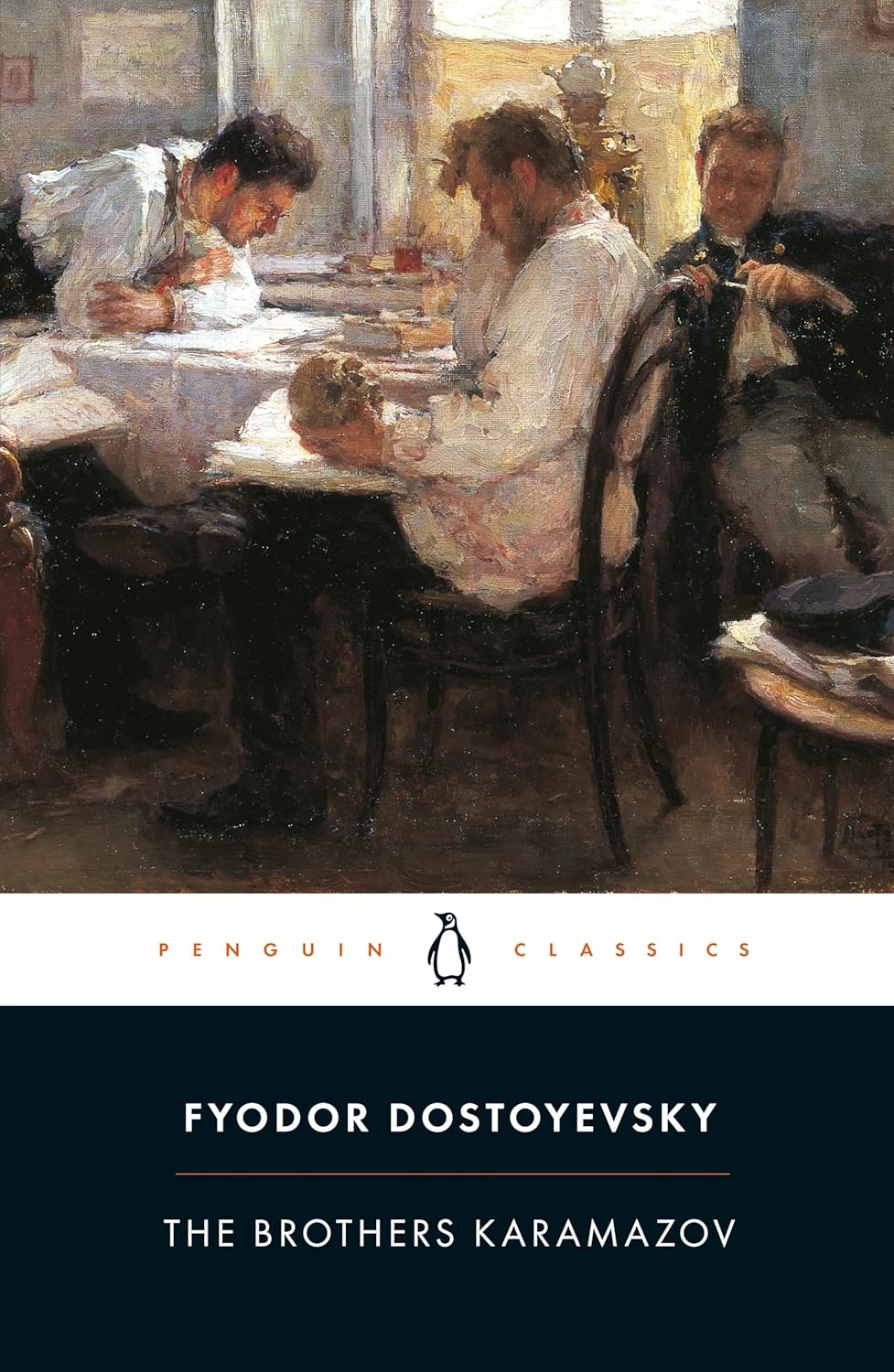The Brothers Karamazov by Fyodor Dostoevsky
About the Author
Fyodor Dostoevsky (1821–1881) is one of Russia’s greatest novelists, renowned for his intense psychological insight and philosophical explorations of faith, guilt, free will, and moral responsibility. His later works — above all “The Brothers Karamazov” — synthesize his lifelong engagement with theology, law, and the social and ethical crises of 19th-century Russia.
Story in Brief
““The Brothers Karamazov”” (published serially 1879–1880) centers on the Karamazov family: the dissolute father Fyodor Pavlovich and his sons—Dmitri (passionate, impulsive), Ivan (intellectual, skeptical), Alyosha (spiritual, compassionate)—and the dark, tragic events that follow, including patricide and a sensational trial. The novel interleaves courtroom drama, theological debate (famously, Ivan’s “The Grand Inquisitor” chapter), moral inquiry, and intimate portrayals of conscience and redemption. It is both a family saga and a sweeping philosophical treatise on faith, doubt, and human responsibility.
Publication history
Serial origin: First published in the journal The Russian Messenger (1879–1880); the novel’s structure reflects its serialized production and Dostoevsky’s late-life mastery of multiple voices and genres.
Translations & scholarship: Multiple influential English translations (Constance Garnett, David Magarshack, Pevear & Volokhonsky, others) have shaped anglophone reception; the book remains a staple of literary scholarship for its theological and ethical probes.
Critical standing: Regarded as Dostoevsky’s magnum opus by many critics; it has been the subject of extensive philosophical and theological commentary from scholars across disciplines.
Why the book has provoked censorship and challenges
Below are reasoned, research-backed explanations for why “The Brothers Karamazov” has at times faced restriction or controversy in different contexts:
1. Religious and theological provocation. The novel stages explicit debates about God, doubt, and theodicy (for example, Ivan Karamazov’s arguments and the “Grand Inquisitor” parable). These passages have sometimes been judged blasphemous or dangerously skeptical in conservative or religiously sensitive environments.
2. Depictions of crime, moral ambiguity, and sexuality. The patricide plot, courtroom sequences, and frank portrayals of vice led some readers and authorities to view the novel as morally unsettling or corrupting—especially for young readers in school settings.
3. Political ambivalence and ideological discomfort. Because the novel resists easy political categorization—criticizing certain social injustices while interrogating revolutionary impulses—it could be framed as ideologically inconvenient under regimes that demanded clear alignment (both left-wing and right-wing authorities have been suspicious of ambiguous, morally complex art). Scholarship on Dostoevsky’s reception in the USSR shows nuanced, sometimes strained, official engagement rather than simple blanket acceptance.
Documented bans, removals, and notable challenges
Kuwait (2018): In November 2018 the Kuwait information ministry blacklisted nearly 1,000 titles showcased at a literary festival; “The Brothers Karamazov” was listed among those restricted, part of a larger conservative turn in Gulf-state censorship practices. This is a recent, well-documented example of the novel being withdrawn from a public festival context.
School and curriculum disputes (periodic & localized): While not repeatedly removed on a massive, international scale like some more contemporary titles, “The Brothers Karamazov” has periodically been considered inappropriate for younger students because of its complex theological content, moral violence, and sexual themes. Records of such challenges are typically local (school boards, teachers, parents) rather than centralized bans.
Historic ideological pressures: Dostoevsky’s complex reception under the Soviet regime involved selective censorship: although his works were not uniformly banned, they were subject to ideological critique and occasional textual shortening or politicized interpretation. Scholarship emphasizes that reception under Soviet authorities was ambivalent—sometimes criticized, sometimes canonized—rather than uniformly suppressed.
Cultural & literary significance
1. Moral and spiritual inquiry: The novel stages some of literature’s deepest conversations about suffering, justice, and human freedom—questions that continue to animate philosophy, theology, and psychology. Readers often turn to the novel when they want intense reflection on conscience and responsibility.
2. A mirror for social anxieties: Dostoevsky dramatizes social breakdown, the limits of law, and the spiritual cost of modernity—making the book persistently relevant when societies debate the balance between legal retribution and moral rehabilitation.
3. Literary power: The novel’s polyphonic form and its interweaving of narrative, sermon, and trial scenes make it a masterclass in how fiction can host argument and emotion simultaneously. That formal boldness is a major reason it continues to be taught and translated widely.

